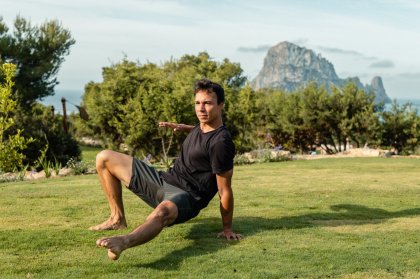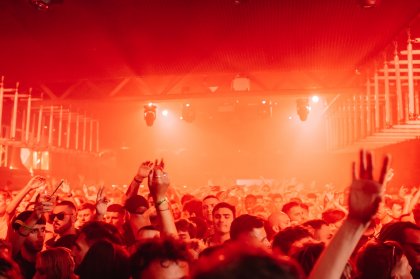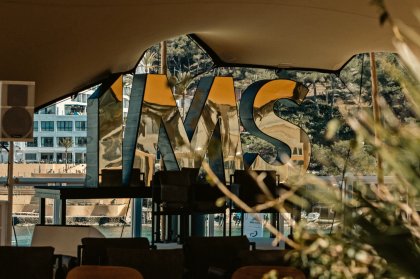What kind of jobs are available?
Summer work here can involve any number of activities. It might be possible to find first-time work on Ibiza without being on the island, but your chances are definitely better if you fly down here to look in person.
- Waiting tables and working in bars is probably the most popular job. Over four million tourists come each year, and the huge number of restaurants, bars, cafés and nightclubs ensure a very high turnover of staff in these industries. Unless you apply to a hotel chain or know of somebody with a bar or restaurant, it is difficult to apply for this sort of job before the summer has started; however, many of the clubs and large hospitality groups have their own careers' pages, though do apply early.
- PR work for the bars, discos and clubs. Ibiza and parties go hand in hand. Public relations work for the clubs and bars is a very important means of advertising the coming nights out. Laws were passed in recent years restricting the number of people able to work for each establishment (bar/club) so there are fewer jobs of this type available. Tasks required for this job include attracting tourists into your nightclub, putting up posters, handing out flyers to the public and leaving them at hotels, cafes etc. Your job is to be a social butterfly, in all. Keep your eyes locked on the workers' pages on Facebook (find the links below), on here you will see a number of PR jobs being advertised, especially at the start of the season. You will need stamina for this job ;-)
- Selling tickets for parties. Much like a job as a PR, it's important to be social and talkative when it comes to selling tickets. Dotted around the island, mainly in San Antonio and Playa d'en Bossa, you will find ticket booths. If your job is to sell tickets for any of the nightclubs, you could be assigned to one of these booths, where it is your job to explain each party and try to sell tickets. On the other hand, you may be walking around the chosen area and bringing tourists to the booths. Like most jobs, look out for advertisements for open spaces on the workers' pages and keep your ears open. Selling tickets for both the boat parties and nightclubs usually pays by commission or by the hour, depending on your boss.
- Sports and the beach. There are several surf and sailing schools on the island, as well as diving, water skiing and jet skiing centres. In order to work as an instructor, you will need the appropriate qualifications. Also, check out other activity centres on land who offer guided tours on wheels such as cycle, scooter, e-bike or quad excursions.
- Hotel (e.g. reception, entertainment, kid's club). One of the jobs here which you can apply for before the summer starts, especially if you apply to one of the bigger hotel chains. Smaller hotels, apartments and clubs will take people on in the early summer months of May and June. Once again, the appropriate qualifications or experience are preferred (not forgetting any language skills, too).
- Dancers and performers. Every nightclub, big or small, needs dancers, as well as outgoing performers and animators for some of the more theatrical events, such as the famed elrow. Talent is the most appropriate qualification and scouts are out there looking!
When should I start looking?
Obviously, it depends on the type of work and the company involved.
- Waiting tables and working in bars. Most bars and restaurants start hiring at the beginning of the summer (early May to early June). Our advice is to fly out to Ibiza at the end of April with a bit of money for the first few weeks and check the local papers (in Spanish, obviously) or go around bars and restaurants asking for work. As the accommodation situation is so difficult at the moment (more about this later), you won't have a problem finding a job. Even if you do not find a job straight away, there is a very high turnover in this industry, so keep asking around.
- PR for the bars, discos and clubs. The party season already starts at the end of April, picking up throughout May. Make sure you are here at this time of hiring. Go to each of the clubs and bars and ask them personally. You should be outgoing, young and (preferably) single ;-)
- Sports and the beach. A bit trickier to find work in these areas. You should be out here at the end of April, beginning of May and be prepared to ask around. Hotels and clubs with sports and entertainment have their own staff - you might like to apply to these directly before the season has started. You might also be involved in the hotel animation programme, which involves taking part in the shows and nighttime entertainment.
- Hotel (e.g. reception, entertainment, kid's club). Already from the beginning of the year, you can start browsing online platforms like Linkedin. You can also apply online directly with the hotels chains on Ibiza like Palladium Hotel Group or Vibra Hotels. Even if you are not lucky first time around, there is a high turnover of staff in the hotel industry, so you might like to fly down here in May and ask the hotels personally or find a job via one of the many ads in the local papers. The ads on the online platforms and in the papers are mostly advertised in Spanish. Browse our hotel guide for the different hotels offered on Ibiza.
- Dancers and performers. During May, a number of casting days will be advertised on the workers' pages. These castings may take place in June too, but it is important to get in early. Experience in dancing and performing is vital, as is plenty of stamina and good health. Keep your eyes and ears open for castings.
What qualifications will I need?
- Languages. With so many tourists here on the island, it is possible to find work without speaking a word of Spanish! We would recommend, however, learning a bit of Spanish before you come. If you are determined to work here next summer, why not take a few Spanish lessons or join a course for a few weeks? A little bit of Spanish goes a very long way. In some areas you will need it, for example, most jobs in the hotel industry require you to speak at least some Spanish, and preferably other languages as well.
- Personal qualities. Work here in summer is as hard as it is rewarding. A six-day week is the norm, and many bar staff have to work seven evenings a week. Accommodation is often shared, and the comforts of home, such as television and air-conditioning, are rare. Remember, though, you will be working in Ibiza. The sun is shining and everyone is here to have fun, so the atmosphere is amazing. The beach is just around the corner, and you might get free or discounted entrance to some of the clubs and parties. The fringe benefits cannot be ignored!!
- Skills and qualifications. As mentioned above, specialist jobs require specialist qualifications. Experience is also preferred for bar and restaurant work.
How much can I earn?
The average summer wage for seasonal jobs is between €1400 (net) and €1800 (net) per month. This does not include tips or commission where appropriate. This may not seem like much, however...
- Some employers will provide accommodation.
- Free entry for the clubs should be easy to come by if you work here.
- The quality of life here cannot be bettered in Europe. The PR jobs involve exploring beaches and chatting to people from across the world. There is a wonderful carefree atmosphere on the island, and almost everyone we know who has worked one season here comes back for a second, and a third....
Accommodation
Finding a place to live is in the moment the biggest challenge when it comes to work on Ibiza. Prices are soaring and the offer is limited. Like anywhere, finding a place to live is first come, first served. Posting on the workers' page for somewhere to live in April/May is near enough useless. At the beginning of the season, a scramble will commence for a space on a roof: most places will already be taken, so get looking early. By August, people often start to drop out, so it is usually easier to find somewhere during that month.
- Home comforts. Honestly, don't expect your own pad unless you want to pay more than €1500 a month. Most workers are on a budget and near enough 90% of accommodation here in Ibiza for workers is shared; but this is the beauty of life out here: you meet your closest friends in this joint room-sharing experience. Save your pennies for a fan and choose your housemates carefully.
- Workers' blocks. There's a selection of block apartments that are in each corner of San Antonio, such as Es Vedra, Palau and Rosalia. These blocks are great if you're here for a party; its much like being in your first year of university: incredibly sociable, a lot of laughs, little sleep! Like most apartments on offer for workers, your best bet to grab yourself a bed is to visit the Workers Accommodation office opposite the Ship in San Antonio or to keep your eyes peeled on their website. Another good accommodation source is the Ibizaworkers Accom website.
- Costs shared accommodation. If you're sharing a room, you're looking at starting prices of €375 - €400. If you want your own room, you're looking at €600 - €700. Some workers blocks can go lower than €375, but this is mainly towards the end of the season. Every accommodation block will require a deposit which should be returned to you at the end of the season, if you haven't smashed the place up or ditched mid season with no sign of goodbyes.
- Ads in newspapers. If you speak some Spanish, you can also try to find something in the two daily newspapers Diario de Ibiza and Periodico de Ibiza. There are rooms, apartments and even some houses advertised; if you are coming with a group of friends or already know workers on the island, this can be an option. Prices for apartments and houses have risen incredibly in the last few years, making them a considerably more expensive option. In addition, many landlords ask you to pay the whole summer upfront, including a deposit and often a fee for the rental agency. There are sometimes a few ads that don't involve agencies; these are marked particular.
- Facebook groups. Search for groups renting rooms and apartments in Ibiza (pisos / apartamentos en Ibiza).
- Cost of taking an entire apartment or house. If you want to have an entire apartment or house and not share with others, you have to be prepared to pay much more. To give you an idea, in 2023 the price for a two-bedroom apartment is between €2000 - €2500 and for a three-bedroom one between €2500 - €3000 per month. Additionally you mostly have to pay an agency fee of one month's rental price and post a deposit. This is only affordable for workers if you have people sharing with you. Having a car means you could consider renting an apartment further away from the main tourist resorts, for example, in the north of the island or somewhere like Cala Vadella, which are both usually cheaper.
- Accommodation offers from employers. Some employers, such as Mambo Group, companies looking for PR staff and especially hotels, may provide accommodation.
Transport
- Buses. Fortunately, there is a very extensive bus network with lots of extra services put on for the summer. During the day you can get buses to most places on the island, even some beaches. From midnight, the Discobus takes over, connecting San Antonio, Ibiza Town and Playa d'en Bossa and also stopping at Amnesia and Privilege. This service runs all through the night.
- Renting a car or scooter for the whole season also might be an option, if you find a good offer. It is better to do this before the start of the season in March or April.
- To buy a car or scooter you have to be an officially registered resident of Ibiza with all the according paperwork - but if you are, this might be an option.
- Your own transport. If you arrive on the island with your own vehicle it can only be used for up to six months. After that period, you would legally be considered a resident and obliged to register your vehicle in Spain.
Information for UK workers
Workers from the United Kingdom will need to apply for a foreigner's identity card, TIE (Tarjeta de Identidad de Extranjero) to prove your right to work. This process has been made more complicated to achieve, (but not impossible) since the UK withdrew from the European Union on 31 December 2020.
Find more information on this site:
Some important points to consider:
Since January 2021, candidates seeking work in Spain for the first time will need to apply for a work and residence visa from the Spanish embassy before applying for their TIE card.
The bureaucratic process can be slow, so it is best to start your application as soon as possible.
Workers who have previously worked in Spain up to five years prior to January 2021 should already be holders of the preceding green version of the TIE card (NIE). This proves that they have already held employment and will allow them to seek work again once they have updated to the new version.
Further Reading
- European Community online - The complete lowdown on working, living, travelling, citizen's rights, etc in the EU.
- Find jobs in these facebook groups like Ibiza Workers Official, Real Ibiza Workers, Season Work in Ibiza, Job opportunities Ibiza. There are many more websites and Facebook groups, simply search for 'Working on Ibiza' in Google.
- Apart from the aforementioned websites Ibiza Workers Accommodation and Ibiza Workers Accomm you find rental offers in these facebook groups: Alquiler de Habitaciones, Pisos, etc en Ibiza, ALQUILER PISOS Y HABITACIONES IBIZA, Rooms For Rent in Ibiza, PISOS Y ALQUILER SIN INMOBILIARIAS EN IBIZA ,TRABAJO IBIZA, MOTOR IBIZA
- Job hunting section of our forums - sign up, ask questions and post a message looking for work.
- Season Workers - a good general seasonal workers website. Some useful tips and information.









